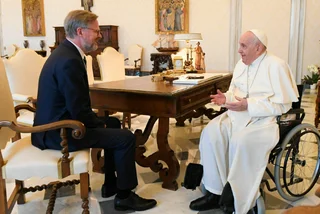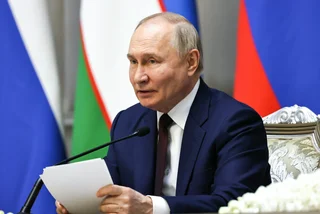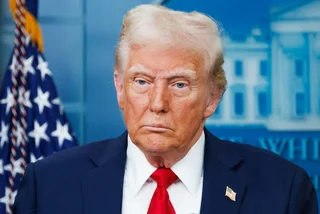Hungarian Prime Minister Viktor Orbán is continuing to be the target of strong criticism from Czech and Eastern European leaders after his wearing of a controversial, historically revisionist scarf last Sunday.
Attending a football match, Orbán was recorded wearing a scarf depicting the territory of Greater Hungary.
This represented Hungary before the post-World War I Trianon peace treaty between the Allied and Associated Powers and Hungary, which saw chunks of its territory become part of Slovakia, Ukraine, Romania, Austria, Croatia, and Serbia.
The nationalistic concept of "Greater Hungary" primarily refers to revisionist ideas in Hungary. Its proponents demand the return of all territories that were taken away after the 1920 Treaty of Trianon.
Strong criticism all round
Senior politicians have strongly criticized the Hungarian leader. Slovak Foreign Affairs Minister Rastislav Káčer voiced unease, drawing on historical precedent. “We saw where such sentiments and plans led in 1939, and we see it live today in Ukraine in the form of Russian aggression,” he said on Facebook.
Czech Foreign Minister Jan Lipavský joined in on the objections, and labeled the provocation “unacceptable." "I fully understand the irritation of our Slovak and other friends,” he wrote on Twitter.
Evropa Äelà nejvÄ›tÅ¡Ãm bezpeÄnostnÃm i ekonomickým výzvám od konce druhé svÄ›tové války. Jednota a spolupráce 🇪🇺 zemà je nynà klÃÄová. Provokace ze strany maÄarského premiéra Viktora Orbána je nepÅ™ijatelná. Zcela chápu podráždÄ›nà naÅ¡ich slovenských a dalÅ¡Ãch přátel. @RastislavKacer
— Jan Lipavský (@JanLipavsky) November 22, 2022
The Ukrainian Foreign Ministry has called on Hungary’s ambassador to Ukraine to explain the situation; Ukrainian Foreign Ministry spokesman Oleh Nikolenko said earlier “revisionist moods in Hungary" were "not in line with European values.”
Romania, which has a large Hungarian minority in Transylvania, also strongly criticized the act. Romanian Member of European Parliament Alin Mituta said it was “a revisionist gesture that places Orbán alongside Putin, who also dreams of changing borders.”
There's also Greater Hungary. pic.twitter.com/La07u81zoB
— David Ashkanasy (@ashkas) February 28, 2018
Orbán responded indirectly on Facebook yesterday, seemingly brushing the issue aside. “Football is not politics. Let's not get involved in something that isn't there,” he wrote.












 Reading time: 1 minute
Reading time: 1 minute 




























